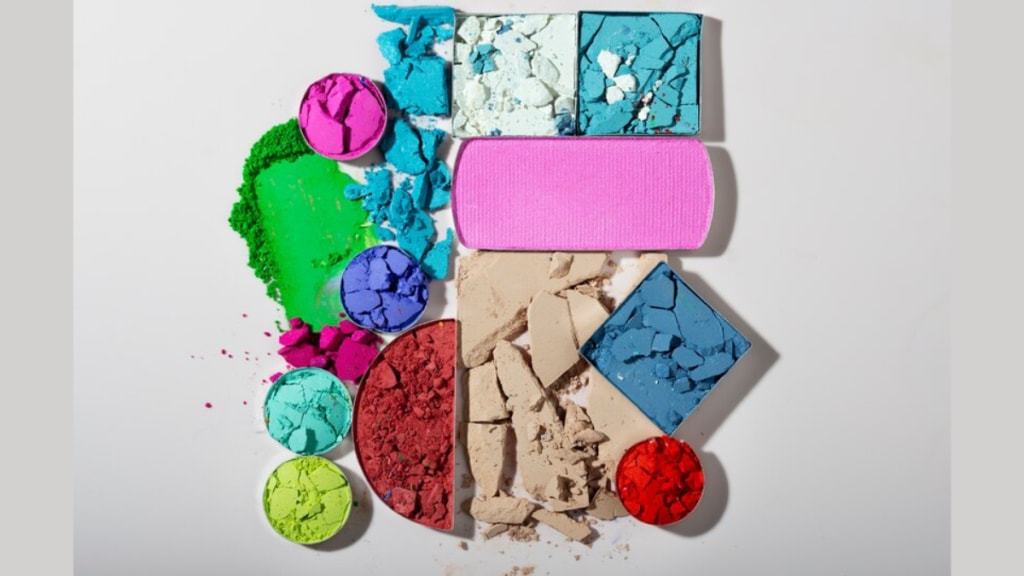Colour me red, pink, mauve, brown and nude… This is what the beauty market’s mantra is, given the high demand for colour cosmetics. Attracted by the growth rate, even brands that started out as just skin care have ventured into make up.
Tapping into consumers’ demand for cleaner, healthier products and GenZ’s want of greater self-expression through makeup, Forest Essentials, Plum Goodness, Mamaearth-parent Honasa Consumer Limited, Organic Harvest and WOW Skin Science are some brands that have delved into the space despite starting as just skincare specialists.
Honasa launched their cosmetic line Staze in April, on which chairman and CEO Varun Alagh commented: “With the colour cosmetics segment boasting a remarkable CAGR of 12% and a substantial size of Rs 15,000 crore, it became evident that there was a gap in the market. These factors paved the way for Staze, which represents a strategic move for Honasa’s unique house of brand strategy to enter the colour cosmetics market.” Offering products at affordable price points, the focus is reportedly on women in the age group of 18-24.
“Since the market penetration is still low, colour cosmetics remain an overall fast-growing segment within the beauty space,” said Shankar Prasad, founder and CEO of Plum Goodness, a vegan beauty and personal care brand that entered the make up segment in 2022 with a full range of products for face, nails, lips, eyes, and even accessories.
For department store chain Westside, by Tata’s Trent, too, “colour cosmetics are our next focus,” as per head of customer & beauty Umashan Naidoo. In May, it launched a new colour cosmetics line for Studio West, its beauty brand.
For Manish Chowdhary, co-founder, WOW Skin Science, which launched its Color Cupid cosmetics range recently, “The idea behind entering the color cosmetics segment was to tap into the growing trend of self-expression through makeup, particularly among GenZ and millennial audiences.”
Anand Ramanathan, partner and consumer products and retail segment leader, Deloitte India, said: “The colour cosmetics market in India is set for substantial growth in the coming years, with projections indicating a compound annual rate of 8-10% over the next five years.”
Such is the demand that as per the data collected from 10 major cities by market research firm Kantar, around 79% of women in the age group of 18-44 years purchased at least one colour cosmetic product in the past one year, said. “The market is currently estimated to be Rs 4,000 crore in these cities alone,” said K Ramakrishnan, managing director, south Asia, worldpanel division, Kantar.
This clearly explains why an increasing number of non-cosmetic-first brands are delving into the space, besides the fact that “cosmetics often have higher profit margins compared to other products, making this segment financially attractive,” as explained by Deloitte’s Ramanathan. “For established brands, entering the cosmetics market is a way to diversify and leverage their existing reputation and customer loyalty,” he added.
For brands already offering clean and sustainable beauty products, the transition is easier, given that consumers are increasingly looking for cleaner, healthier alternatives. “The popularity of natural and organic cosmetics is on the rise, driven by growing consumer awareness of product ingredients. Brands offering clean and sustainable beauty products are expected to capture a significant market share,” said Ramanathan.
Skincare brand Forest Essentials has a ‘natural makeup’ range through which it is “eager to elevate our glam without compromising skin health for all the right reasons,” as the company says on its website.
For Plum Goodness, “The idea of launching colour cosmetics came from our loyal customers. Our customers love the selection, efficacy, and value that our products offer, all with the trustworthy 100% vegan promise,” said Prasad. “We speak to that makeup customer who looks beyond just the instant payoff/gratification of the colour she puts on, and thinks of textures, ingredients used (and not used), its impact on skin, and whether the brand is truly vegan and cruelty-free,” he added.
On similar lines, Westside’s Naidoo said, “We like to rethink ingredients and seek cleaner alternatives, with many beauty products being vegan and prioritising formulas that benefit the skin. This approach resonates with today’s customers, who are more conscious about the products they use.”
He explained that Covid-19 accelerated the shift towards social media, which, in turn, democratised beauty and fashion styles.
Chowdhary of WOW Skin Science, too, highlighted the role of the Covid pandemic, which “accelerated the influence of social media and digital marketing, increasing consumer awareness and purchasing of colour cosmetics. As more consumers turn to online platforms for beauty inspiration and product recommendations, we see a clear shift towards greater experimentation, self-discovery, and individual expression in makeup choices.”
Adding to it, Ramanathan said, “Evolving beauty standards and a push for inclusivity encourage a wider range of colour cosmetic options. With shifting beauty norms and a focus on individuality, consumers are more willing to try new cosmetic products.”
Here, the analyst further highlighted that the demand for colour cosmetics is not limited to major metropolitan areas. “Tier-II and III cities are becoming great growth drivers as awareness and disposable incomes increase in these regions.”
Having said that, “the category is just at the beginning of its growth phase, and setting up a base for accelerated growth well into the future,” said Ramakrishnan.

